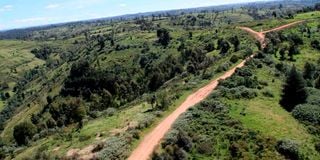Kenyans invade forests for charcoal after lifting of ban

The restored Maasai Mau Forest in this photo taken on October 31, 2020
Ten days after President William Ruto announced the government’s decision to lift a logging ban, Environment Cabinet Secretary Soipan Tuya says some people have started encroaching on forests.
The CS said the invaders are engaging in illegal activities such as charcoal burning, with some building structures and even leasing out forest land.
Speaking at the launch of the Parliamentary Conservation and Climate Change Caucus in Nairobi yesterday, Ms Tuya told MPs the government needs their support now more than ever to protect and save forests from human destruction.
“We need your support to remove people from the forests who are doing illegal activities because they are your constituents,” Ms Tuya said.
Also Read: Ruto lifts ban on logging
“We have just finished an operation in Mau Conservancy. There are several other forests, including Kareta Forest in Narok North and Sasimwani Forest, where we have Kenyans who think the forests are free for them to go and erect structures and engage in illegal activities as well as lease out forest land,” Ms Tuya said.
The minister said some forest officers have been interdicted in the affected areas.
Ms Tuya also defended government's lifting of the logging ban.
“There is no cause for alarm. Agro-forestry and commercial forestry are part of ‘The Plan’ because the timber industry is doing badly,” she said.
“One of the reasons why we have commercial plantations in our gazetted forests is because they were established for the purpose of industrial or commercial forest products,”Ms Tuya said.
Commercial forests comprise about 150,000 hectares out of almost two million hectares.
Ms Tuya said her ministry would be giving clear instructions on logging, noting that the government will not tolerate illegal activities. “We have deployed more rangers because we are aware that the level of illegal activities in our forests is now very alarming,” she said.
While praising Ms Tuya’s efforts, Deputy President Rigathi Gachagua urged MPs to put aside party differences and address climate change.
“The launch of your Strategic Plan for Climate Action and Environmental Sustainability and the Kenya Parliamentary Caucus on Climate Change comes less than two months before the Africa Climate Summit 2023, which we will host in Nairobi in September. Under the theme ‘Africa's March to Sustainable Economic Transformation and Green Growth’, we will seek to enhance co-operation on sustainable solutions to climate change,” Mr Gachagua said.
Also Read: Lands ministry mulls lifting Mau land ban
He added that about 89 per cent of Kenya's land is arid and semi-arid, covering 29 counties.
“The rapidly expanding aridity poses a threat to humanity if the trend is not brought under control,” the DP said.
Mr Gachagua told MPs that the government is taking steps to reduce the rate of desertification.
“One of them is the target of planting 15 billion trees by 2032. This will increase our forest cover to over 30 per cent. But with a population growth rate of about 1.9 per cent, we will put pressure on resources and threaten the forests again,” he said.
The DP added that the country urgently needs climate-smart laws.
“As part of your first mandate, we expect you to review current laws, policies and development frameworks and advise on their alignment with environmental sustainability,” Mr Gachagua said.
Njoro MP Charity Kathambi Chepkwony — who is the chairperson of the Parliamentary Conservation and Climate Change Caucus — said legislators are planning to push for the amendment of the Constituency Development Fund (CDF) Act No. 30 to increase the allocation from three to five per cent so that they can use the funds to address the climate crisis at the constituency level.





